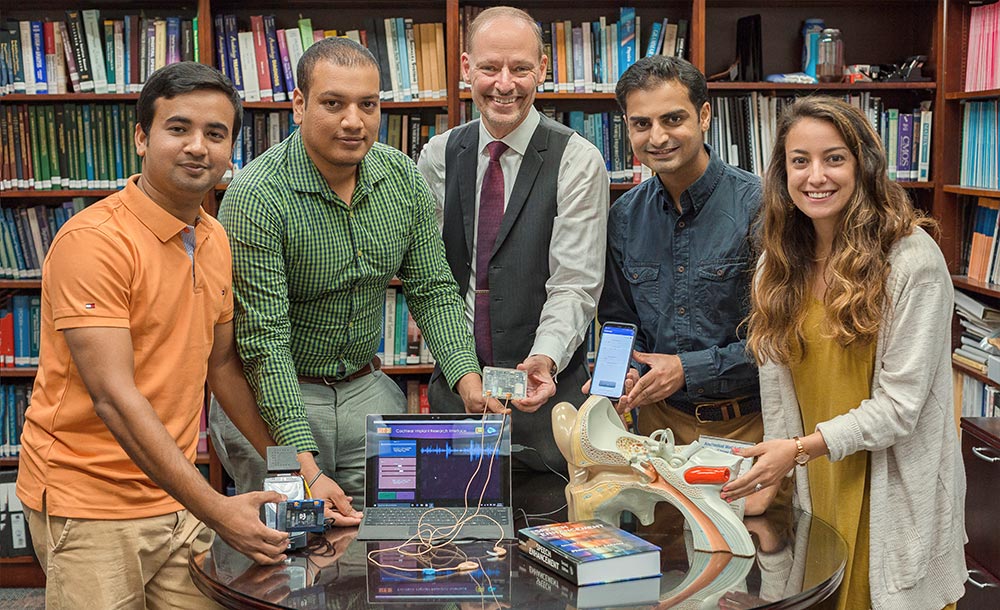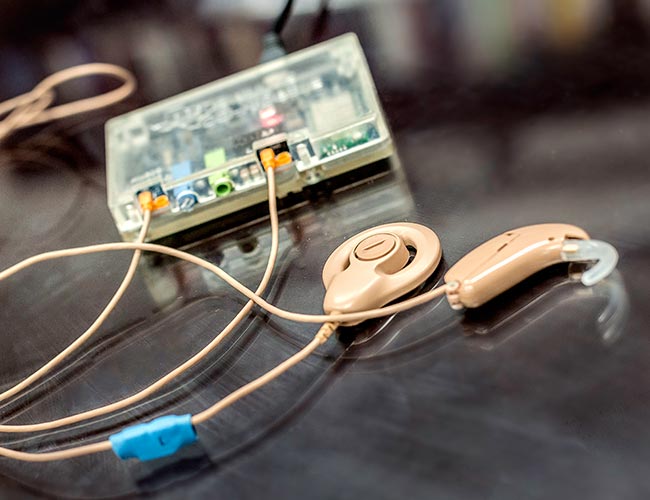Speech Systems Team Receives Grant for Cochlear Implant Project
By: | Oct. 25, 2018

From left: Research assistant Nursadul Mamun, teaching assistant Ram Charan Chandra Shekar, Dr. John Hansen, senior research scientist Hussnain Ali and research assistant Juliana Saba show off the tools in their CCi-MOBILE project. The CCi-MOBILE research interface, held by Hansen, connects to microphones, which a user of a cochlear implant or hearing aid wears to collect audio. The data is processed with algorithms on a connected laptop or smartphone. Then, CCi-MOBILE sends the processed audio through another connection to the user’s cochlear implant or hearing aid.
According to the Centers for Disease Control and Prevention, approximately 15 percent of adults report some degree of hearing loss. It’s the third-most common chronic physical ailment, twice as prevalent as diabetes or cancer.
Those kinds of numbers haunt Dr. John Hansen, professor of electrical and computer engineering at The University of Texas at Dallas.

About CCi-MOBILE
The CCi-MOBILE research platform enables easy development and evaluation of sound processing algorithms/strategies with cochlear implants as well as hearing aids. See some of its features in this video.
“Losing your hearing disconnects you from family, friends and society,” said Hansen, who holds the Distinguished Chair in Telecommunications in the Erik Jonsson School of Engineering and Computer Science. “That’s why we need to make sure we are providing the best hearing devices we can.”
Hansen has received a $3.2 million grant from the National Institutes of Health to develop new sound processing algorithms that may improve cochlear implants (CI). The devices consist of an external microphone and processing unit that are connected by a magnetic coil to a second component surgically implanted under the skin behind the ear. The implant translates sound from the external unit into electrical signals that stimulate nerve cells in the cochlea in the inner ear. Those signals then make their way into the brain as sound and speech.
Cochlear implants are especially effective for adults who lost their hearing after attaining speech and language abilities, and they work well in quiet environments. However, it’s difficult for the technology to discern background noise or distortion from close human conversation.
Hansen and his colleagues at the Center for Robust Speech Systems-Cochlear Implant Lab (CRSS-CILab) have developed CCi-MOBILE, a mobile research platform that allows researchers to “test-drive” new audio processing algorithms in the lab or in natural settings where CI users have the most challenges.
“Our system is portable and supports mobile field testing, which is a major breakthrough in assessing hearing advancements for cochlear implant and hearing aid users. A researcher can now connect a smartphone with the CCi-MOBILE platform and allow the CI subject to keep everything in their pocket or purse and go anywhere to try out new processing algorithms.”
Dr. John Hansen, professor of electrical engineering and the Distinguished Chair in Telecommunications
“One long-standing problem for academic researchers is testing new algorithms within a cochlear implant system,” Hansen said. “CI manufacturers must seal their devices, which prevents testing of algorithms with actual implant users. You can’t just take a screwdriver and pry off the outside casing of the implant and start changing the computer code.”
The CCi-MOBILE research interface is a self-contained computer board about the size of a business card. It has inputs that connect to behind-the-ear microphones, which a user of a cochlear implant or hearing aid wears to collect audio. CCi-MOBILE then processes this incoming data with researcher-defined algorithms that are running on a connected external device, such as a laptop or smartphone. Finally, the processed audio is sent back from CCi-MOBILE through another connection directly to the user’s cochlear implant or hearing aid.
The CCi-MOBILE research platform allows for single or dual CIs or hearing aids, or a mix of the two.
“This flexibility will open up many new research capabilities for academic researchers in the field and allow them to test their solutions with CI users in natural home, office or daily interactions,” Hansen said.
While the current CCi-MOBILE platform is strictly a research interface and not yet intended for clinical use, CI users are testing the platform in noisy environments.
“Our system is portable and supports mobile field testing, which is a major breakthrough in assessing hearing advancements for cochlear implant and hearing aid users,” Hansen said. “A researcher can now connect a smartphone with the CCi-MOBILE platform and allow the CI subject to keep everything in their pocket or purse and go anywhere to try out new processing algorithms.”
The late Dr. Philipos Loizou, a professor of electrical engineering at UT Dallas and a pioneer in the field of cochlear implants and hearing aids, originally had the idea to run code on an external computing platform. He developed an interface that enabled an external personal digital assistant to process acoustic signals, such as speech, through a microphone worn behind an individual’s ear.
Since Loizou’s death in 2012, Hansen and his colleagues have continued Loizou’s research by engineering the CCi-MOBILE platform to support both cochlear implants as well as hearing aids to work with commercially available smartphones and tablets.
“Philip Loizou had a vision, and we are happy to see this new project continue the legacy he established during his career at the Jonsson School,” Hansen said.
UT Dallas is the lead institution on the new grant, which also includes collaborators at the University of Wisconsin-Madison and New York University Langone Medical Center.
Media Contact: The Office of Media Relations, UT Dallas, (972) 883-2155, newscenter@utdallas.edu.





